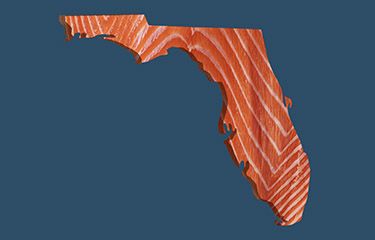A Florida connection has brought together pioneering salmon farming firm Atlantic Sapphire and the Publix supermarket chain.
Atlantic Sapphire, which recently celebrated its first commercial harvest at its new recirculating aquaculture system (RAS) farm in Miami, Florida, U.S.A., is teaming up with the Lakeland, Florida-based supermarket chain to begin offering its Bluehouse brand salmon in 269 of its 1,255 stores, mostly in the Miami area.
Atlantic Sapphire CEO Johan Andreassen told SeafoodSource while his firm is seeking out retail supply contracts, including with Giant Eagle, H-E-B, New Seasons Market, Safeway, Sobey's, Sprouts Farmers Market, and Wegmans, as well as with specialty salmon product providers such as Acme Smoked Fish, obtaining a partnership with fellow Floridian firm Publix had special meaning.
“Given Publix’s vast regional footprint – and the aligned Florida home base, catering to consumers in our backyard market, and beyond – it was immensely important to establish a partnership with Publix,” Andreassen said.
With a corporate mission of supporting more sustainable, domestic aquaculture projects, Publix was equally eager to source local product in Florida from Atlantic Sapphire, according to Publix Business Development Seafood Director Guy Pizzuti. When executives from Atlantic Sapphire approached Publix executives about a potential partnership several years ago, “we told them they had our support even before they bought their land,” Pizzuti said.
“We knew that they had the knowledge, the sustainability passion, and saw the benefits of bringing a local product to our region. In turn, they knew we would work with our stores to execute and support the program,” he said. “Farmed salmon is the most consumed seafood in the United States. While there is some aquaculture salmon production in Maine, the vast majority of the product sold in the U.S. comes from Chile and Norway. By supporting this and other similar products, we are reducing the trade deficit and our reliance on imported product.”
Additionally, partnering with Atlantic Sapphire provides a number of benefits to the local economy and “significantly reduces the carbon footprint for this product as we do not have to fly it in from overseas,” Pizzuti said.
Atlantic Sapphire’s Miami operation is currently the largest salmon farm operating in the U.S., on land or in the sea. The farm utilizes 95 percent salt water and 99 percent recycled water source, uses no antibiotics or pesticides, and enforces low stocking density levels, at 95 percent water and 5 percent fish – all traits that attracted the support of Publix.
Plus, land-based aquaculture systems “provide a true opportunity for the seafood industry to increase production,” Pizzuti noted.
“Locally raised [fish from aquaculture] is a relatively new trend that is beginning to see some growth in the U.S. As land-based recirculating systems have continued to evolve and improve, these operations are becoming more feasible and scaled for production,” Pizzuti said. “In the traditional aquaculture operations, the ability to increase production is somewhat limited by space. There are only so many areas that are conducive to aquaculture and those areas already have farms. By moving the operation on land and under roof, you have the ability to increase production while reducing the impact on the environment.”
Publix is also evaluating other “new emerging opportunities within domestic aquaculture” and will bring those to market “at the appropriate time,” according to Pizzuti.
Pizutti said the initiative was part of the company’s seafood sustainability initiative. In the past few years, Publix has been involved in many other seafood sustainability projects and fishery improvement projects. For example, the retailer is partnering with Sustainable Fisheries Partnership (SFP) to protect the critically endangered North Atlantic right whale. And during this year’s snow crab season, as part of a Publix-funded fishery improvement project, SFP piloted a “ropeless catch” program.
“For sustainability to truly take hold in the industry, it requires a partnership between the retailer, the industry, and the environmental group,” Pizzuti said.
Photo courtesy of Atlantic Sapphire’s Bluehouse Salmon brand







